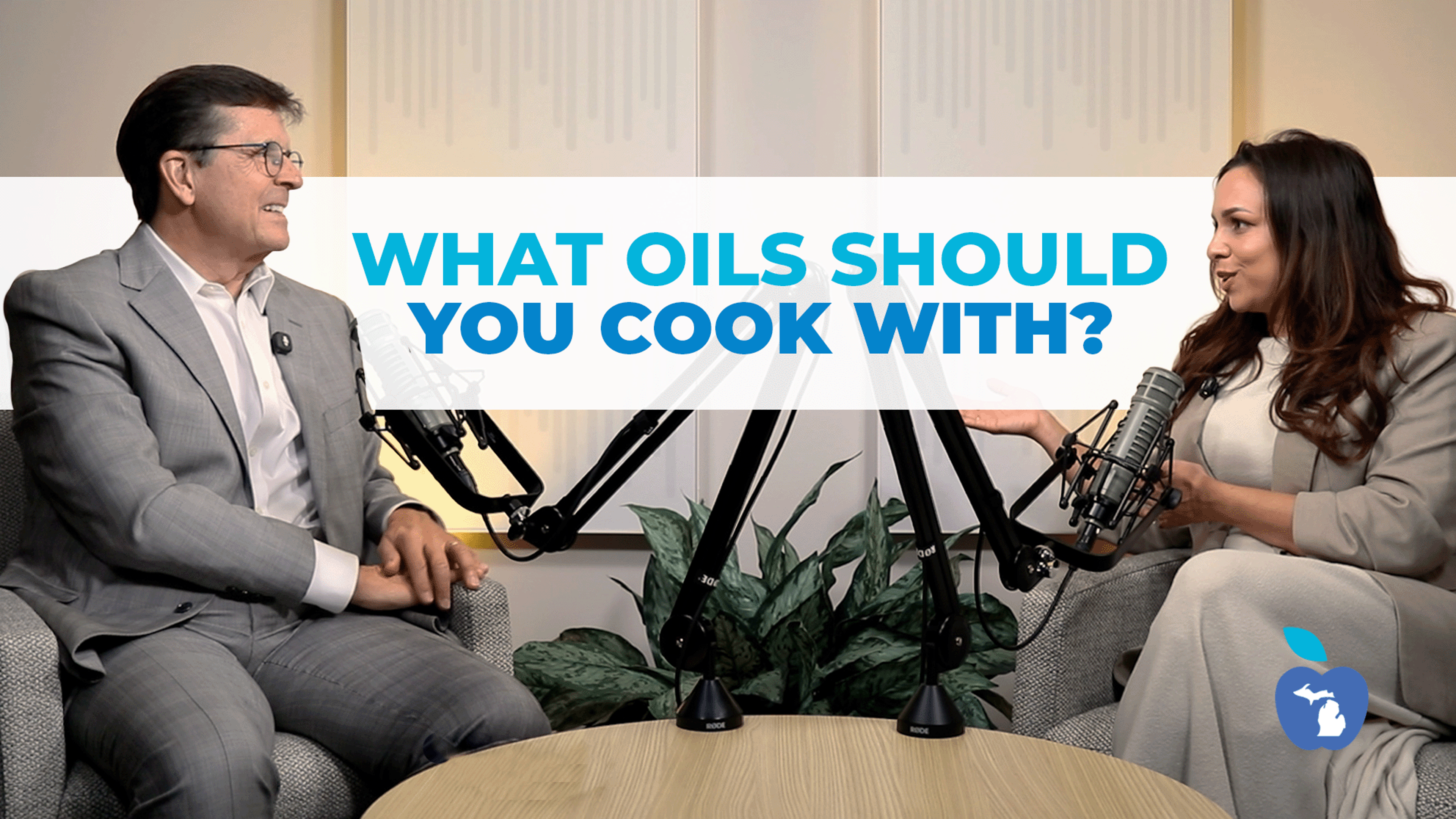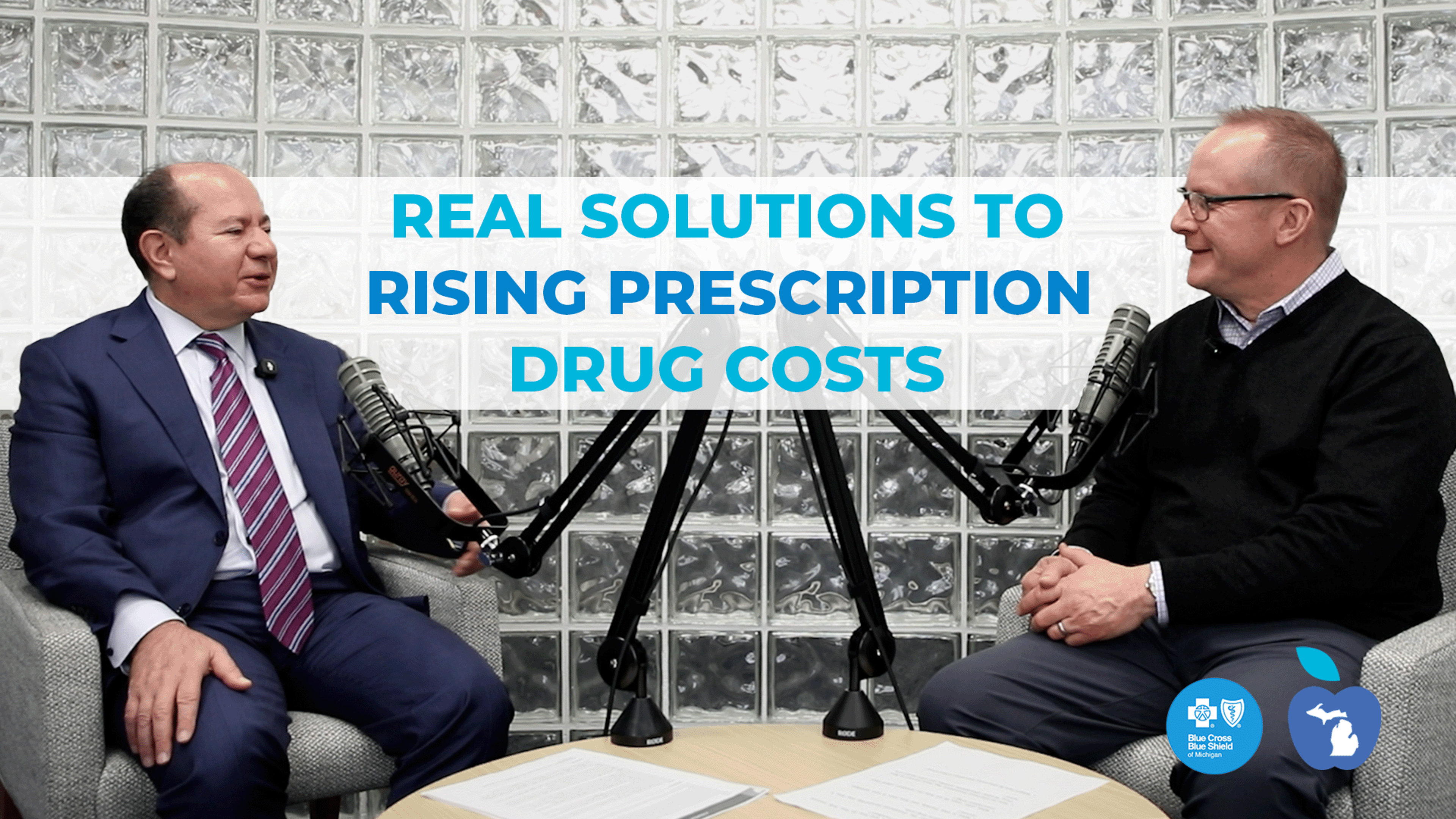Is Manifestation Healthy or Harmful?
| 1 min read

00:00
00:00
About the Show
On this episode, Chuck Gaidica is joined by Sydney Lipsey, Manager of Behavioral Health Strategy and Planning for Blue Cross Blue Shield of Michigan. Together, they discuss ways manifestation may affect your wellbeing.
In this episode of A Healthier Michigan Podcast, we explore:
- How manifestation is viewed and defined
- Differences between manifestation and positive thinking
- How to approach practicing manifestation
Transcript
Here is the full transcript of this episode. You can listen to the audio version on streaming platforms or watch on YouTube.
Chuck Gaidica:
Walt Disney has been quoted as saying, "If you can dream it, you can do it." And a similar idea has taken social media by storm in the form of something called manifestation. But how effective is it when it comes to our health? This is A Healthier Michigan podcast, episode 158. Coming up, we will be discussing ways that manifestation might affect your well-being.
Walt Disney has been quoted as saying, "If you can dream it, you can do it." And a similar idea has taken social media by storm in the form of something called manifestation. But how effective is it when it comes to our health? This is A Healthier Michigan podcast, episode 158. Coming up, we will be discussing ways that manifestation might affect your well-being.
Welcome to A Healthier Michigan podcast, it's a podcast dedicated to navigating how we can improve our health and well-being through small, healthy habits that we can start implementing right now. I'm your host, Chuck Gaidica. Every other week we'll sit down with a certified expert and we discuss topics that cover nutrition, fitness, a lot more. And on this episode, we're diving into manifestation to understand the potential health risks or benefits of it. With me today is Sydney Lipsey, who's manager in behavioral health strategy and planning for Blue Cross Blue Shield of Michigan. It's good to have you with us, Sydney.
Sydney Lipsey:
Thank you, Chuck. It's great to be here.
Chuck Gaidica:
Well, there are all kinds of things to think about here. According to the law of attraction, people have heard that lots of books about it, podcasts, positive thoughts attract positive outcomes, whereas if you maybe ruminate on negative thoughts that can attract negative outcomes. So this idea has been interwoven into this word that we hear, manifesting, which refers to this practice of you're manifesting inspirational or aspirational ideas to make them a reality. Kind of like the coach goes into the locker room, I can see through the walls, and, "We're going to win, fellas, and then let's go get them." And there's this positive attitude that's attached to it.
And arguably it seems in different varying forms, this has become a more popular idea. So if you jump on social media, you've probably seen it within the last year, it's likely you've come across an influencer or more than maybe one, mentioning how they manifest their success, and that, "You can do it if I can do it," kind of thing. And while this practice does talk about positivity, and that's one of my top strengths in life, it seems like there can also be a downside to this idea, right?
Sydney Lipsey:
Yeah. Yeah, it's definitely interesting because I think there is something to that of thinking about when you look for the positives and you're thinking about the positives, that's generally what you see in the world and in the people that you're interacting with day to day. But if you're only focusing on things that are negative, that is all you see are the negatives, and that's because that's what you're looking for with those types of beliefs and when you have that thought process.
Chuck Gaidica:
To be honest, I've never used... well, maybe I have in a way... never used a physical vision board. That's another part of this idea of manifesting, right? "I'm going to put things on my board. I'm envisioning that I'm living in a 36-room mansion, driving a Bentley, looking at the ocean." It's never happened. But if I put it on the board, and I think positively, I'm heading in that direction. And it seems like one of the downsides, Sydney, could be that that never happens. And then I'm like... "It didn't happen."
Sydney Lipsey:
Yeah. So I think that when you're looking at manifestation and you're looking at positive thinking and things like that, it does help, but only to a certain extent because I think it can help shift the way that you think about things, and it can help shift your overall view on situations and things like that. But it can also start to shift your actions. So when you start to look at things of wanting the 36-room mansion, if you start to think about, "Well, what do I need to do to make that a reality?" It starts to shift it from manifesting the thought to manifesting in action.
And I think that's where there's a little bit of a disconnect is that manifestation is not just a thought process because the thought process alone does not control the outcome. But if you have the thought process that starts to shift and impact your actions, that's where, I think, you can see some noticeable changes.
Chuck Gaidica:
So, Sydney, this idea of positivity has got great upsides too from a mental and behavioral health standpoint. Do practitioners and professionals in the field define and view manifestation? Is that a thing that you talk about professionally?
Sydney Lipsey:
Yeah, I think that the thought of manifestation has actually been in mental health treatment for quite a while, but it's actually been incorporated within cognitive behavioral therapy. And what cognitive behavioral therapy identifies is that your thoughts, your actions, and your behaviors are all linked. So there's a cyclical pattern of your thoughts can lead to your actions, which can lead to your beliefs, which then go back to your thoughts, and so on, and it just goes around in a circle.
So if you can start to shift the way that you're thinking, you then start shift the way that you're acting and shift your actions, which can shape your beliefs. So it has been around but not as manifestation.
Chuck Gaidica:
And in a lot of previous episodes, we've had discussions about balance, that comes up a lot, whether it's your eating, your lifestyle, your exercise, just finding a good balance. And I think for a lot of us, we have a balance in that we're trying to be encouragers. I want to start jogging. You're a jogger, you say, "Well, hey, come with me. I'll help you along the way, pal." There's that positive effect. I'm a girl dad and a boy dad, I've got five kids, so I tell my daughters as well as my sons, "You can be an astronaut." So there's that positive thing of reinforcing body image and so forth.
So I think for some of us, we take that for granted, but where does it go off kilter where for some it just becomes too much of a thing that starts to influence their mental or behavioral health?
Sydney Lipsey:
Yeah, I think where it can become too much is if someone is so focused on the act of, "I only have to think about this, I only have to..." When they're not taking the action. So if you're solely focused on, "If I sit in my room and I make my vision board, these things will come true..." And I can give you a personal example. So I'm actually competing for the title of Mrs. Michigan America this weekend.
Chuck Gaidica:
What? Oh, congrats. That's awesome.
Sydney Lipsey:
Thank you. So there could have been two paths that I could have taken. So I could have tried to manifest by thought and said... and made a vision board with the crown and the dress and things like that. But that's not going to help me when I actually get on stage this weekend to compete. But instead, I have taken that thought process, and thought about what is it going to be competing? What is it going to be like with having this title? What will it be like to represent Michigan?
And then thinking about it from that aspect, it's helped me shift my preparation for the weekend to make sure that I'm practicing walking in the attire that I'll be wearing on stage, that I'm talking to... I'm participating in things like this that I may not have done before that I'm working on spreading the message about mental health treatment, mental health awareness, and the different components of that. So it's forced me into... I don't want to say forced, but it's shifted my mindset from walking in unprepared to thinking about what it takes to be prepared.
Chuck Gaidica:
Well, and that could seem subtle to some, but that's a dramatic shift from... I shouldn't say just because it does sound like I'm diminishing this idea of being positive, but it's shifting to more doing in a way than being and just being, and ruminating in this idea of being positive. You're rehearsing, you're practicing whatever else that has to go along with it. Is there a way if you've got to practice that? I don't know.
Sydney Lipsey:
No, thankfully. And there's no talent either, so that's good.
Chuck Gaidica:
Well, this is really interesting because here you are setting up for something like this, but that goes back to other episodes we've talked about smart goals. You've got to use your idea of making it something achievable. And here you are hitting a stage, a big stage. Congrats. That's awesome.
Sydney Lipsey:
Thank you. Yeah, and I think that shift from thinking about manifesting to actually shifting into action, I think where some get hung up on that is that the actions that need to be taken to achieve the goals sometimes are very hard. So it's making sure that you're keeping the bigger picture and thinking about what you're trying to manifest, and keeping that as the focus while you're in those times that maybe are a little less fun in the progress towards that.
Chuck Gaidica:
Is there a component of this, Sydney, where it would seem to me that if you're going to lead a life of manifesting, there are a lot of I messages, "I can do it, I will do it, I can achieve it." And in reality, it's often a team of people. It could be your spouse, your family, or encouragers, other former Mrs. Michigans or something. So can we get stuck if we're just saying that, "It's all about what I can do," and then we realize somewhere in this, "I can't do it. Really, I just can't."
Sydney Lipsey:
Yeah, I think that's definitely something that can happen, especially if you are trying to manifest something that's very, very large because you're right, there's a lot of areas in our lives that it does take a village, it's not something that one person can do, whether it's someone teaching you a skill, someone supporting you, someone assisting. There are a lot of things that you do need others' involvement, even historical involvement to achieve those goals. So I think there is a difference too of self-encouragement and self-belief of, "I can do this," but also recognizing that it's okay to say, "I might need some help with this part," but even if I get help with this part, that doesn't mean that I didn't achieve this.
Chuck Gaidica:
And maybe also take stock in some of the small victories, even if it's along the way. If you're trying to do a 25K, doing a 5K first isn't a bad achievement.
Sydney Lipsey:
Yeah, absolutely. Absolutely. And I think you bring up a great point there of checking in on our progress along the way, because again, especially when you have those very, very lofty ambitions, if you're not taking the steps to say, "Okay, we've made it here, we've made it there," and breaking it down like that, that can be very discouraging in the long run.
Chuck Gaidica:
So if someone is... they've been exposed to this idea of manifesting in a positive way, and maybe they've even practiced it and they've seen some success in this, what advice would you give them of how to continue to approach this and adopting a mindset of positivity or even manifesting your destiny? What would you suggest are ways to bolster that idea to lead to some successes?
Sydney Lipsey:
Yeah, I would definitely say... And when I was a practicing clinician, I always would focus on people's strengths. So I would say to really focus on what are the things that you're comfortable with? What are the things that have worked for you in the past? And build from those. And that could be a way to manifest and to continue to grow on that skill.
Chuck Gaidica:
And again, that could also be... it can come back to so many other great things we just discussed of building on small achievements, smaller. Not that they're insignificant in your life, but really building on stepping stones that lead you to that point where you're like Rocky Balboa running up the stairs and saying, "I've done it." From a behavioral health standpoint, I have to share with you, I've always had, not trouble with heights, this is a weird thing in my life, I'm a private pilot, I can fly upside down, I can fly in a jetliner, I have no trouble. You ask me to get on a ladder and clean my gutters, my knees get a little shaky. If I drive over a big bridge, I don't have to really worry about it, but it's always been kind of a thing.
So last year I had the chance to go to the top of the Mackinac Bridge, the Big Mac bridge. And I got out on top 500 some feet off the Straits of Mackinac, and I pushed myself. I wasn't manifesting that I'd see myself pop up, but I knew it was a push, and I got up there and I have to share with you, I don't know if cure is the right word, I don't really have a problem anymore. I pushed myself into something that was a bit of a stretch, I did it, and I thought, "Well, this ain't so bad. I'm not going to fall." And so from a behavioral standpoint, it helped me get to another level of, I think, better health, I'm not a little wobbly when it comes to getting up at roof height. It's interesting.
Sydney Lipsey:
Yeah, and I think that that also brings up a great point too, is that sometimes you just have to show yourself that you can do something before you know that it's capable. And one thing that I always point to is when the four-minute mile was broken, no one thought that that was achievable to break four minutes for one mile during a track and field race. But once it happened, it started happening a lot because people realized that it was available to them.
Chuck Gaidica:
Where do you counsel or have you in the past people who really lead such positive lives that they are seeing results, that this is a real thing in their life? Because you and I probably have met people that walk around and they seem like they have that Charlie Brown cloud that's running around them all the time, and then there are other people who they just think about it, they get it done, they achieve, they're successful. And so there are people who are living examples of doing things like that. Is it the context that it really does work for some and not for others? Is it that simple?
Sydney Lipsey:
I think that it also goes back to a self-belief too, and what we're looking for because my mom was always fond of saying, "If you want something done, give it to a busy person because they know that's what they're doing every day, is getting things done and getting lots of things done. So that's what their thought pattern is, and that's what their focus is, is getting things done." So I think when you're seeing people out in the world that just seem to get things done, that's what they're focusing on. But then when you see people who are frustrated or things like that, you could be catching them on an off-day. But if that's their sole being, that's what they're looking for is what's frustrating them in that situation.
Chuck Gaidica:
So for people who are getting things done, and that's just one example in this world of things, should they become our new best friends? Should we be learning from them? Should we be taking the example from your mom's ideas and others that, "Well, there's somebody who it works for, I want to know a little bit more about that hack"?
Sydney Lipsey:
Yeah. Again, I think it goes back to a sense of balance because we could see them getting everything done, but that they could actually be burning themselves out by being in that pattern of trying to get everything done and taking on too much too. So it does go back to that sense of balance and knowing what our boundaries are. But I also think that it's knowing what we want for our lives, and knowing what we want for those situations and those social relationships and family relationships. How do we want those to be? And how do we want those to balance out with our work life and things like that as well? So once you know those aspects, you can start focusing on the things that will help increase the likelihood of the outcomes that you want to see in those relationships.
Chuck Gaidica:
And back to the wisdom of Mom for just a minute, that's an intriguing thing. It's in my head because we've had a lot of people in our lives that become influencers. So if you are one of those people that gets things done, you have a positive view, you're not woe is me, you have the potential to influence in a positive way, I would think, mental health and behavioral health of your own children, your spouse, your friends, that you could be helping them because of the way you operate in life.
So if we moonwalk back just a minute, this idea of manifestation, what are kind of proven methods that you would suggest individuals explore? Maybe you want to dip your toe in the water of these ideas of positivity, et cetera. What would you suggest we should start to think about if we want to explore this idea?
Sydney Lipsey:
Yeah, I think if you want to explore the idea of manifestation, I think it starts with what do you want to manifest? What do you want to see? And then you can start thinking about it. Vision boards, like you said, are also great. But I think identifying what you want is by far the first step to make sure that you can start focusing on how to take action and how to start living your life the way you want to so that you can achieve those results and achieve that goal.
Chuck Gaidica:
Any other takeaways you've got for us before we wrap this one up?
Sydney Lipsey:
The only other thing that I could say is that, like we said at the very beginning of the episode, what you look for is what you're going to find. So if you notice yourself having a bad day and you want to change that, you can start looking for things that are good, start looking for things that make you thankful. If you notice that if you want a promotion or you want something better for your life, you can start to look for what actions that you need to take for that. So I think that's the biggest takeaway is whatever you're looking for is what you'll start to see.
Chuck Gaidica:
And so much of other things are wrapped up in there, gratitude, giving yourself some grace, if you don't happen to, you jump for the brass ring, but you missed it this time, there's another chance. There's so many other things in there that we could probably talk about forever. But I guess from a healthful standpoint, just giving yourself a little grace that it isn't always going to be roses and sunshine, but that you can still be positive. Don't give up on that idea either.
Sydney Lipsey:
Yep.
Chuck Gaidica:
Well, listen, Sydney, it's been great having you. Thank you. And I can't wish you enough... it's not even luck, just much success this weekend. That's awesome. We're going to be thinking about you as we head into the weekend and beyond because who knows when somebody catches this episode, but it sure would be nice. I can say, "I knew her when she was talking about being positive, and now look at this." So much success.
Sydney Lipsey:
Thank you. Thank you.
Chuck Gaidica:
Yeah, thanks for being with us. Sydney Lipsey, who's a manager in behavioral health strategy and planning for Blue Cross Blue Shield of Michigan. What a joy that is. Thanks for listening to this podcast. A Healthier Michigan is brought to you by Blue Cross Blue Shield of Michigan. If you like the show and you want to know more, check us out on the newly refreshed website we have, it's called ahealthiermichigan.org/podcast. You can leave us a review or rating on Apple Podcast or Spotify, we've got a YouTube channel, or you can follow us on Facebook, Instagram, or Twitter. And you can get all the episodes, old episodes, new episodes on your smartphone, tablet. So be sure to subscribe to us on Apple Podcast, or Spotify, or your favorite podcast app. I'm Chuck Gaidica. Be well.





